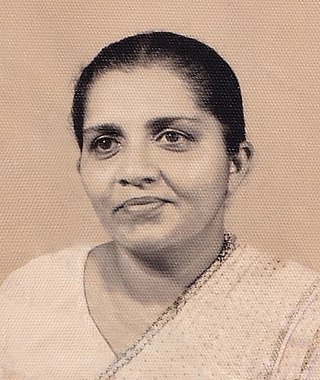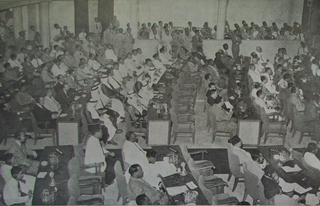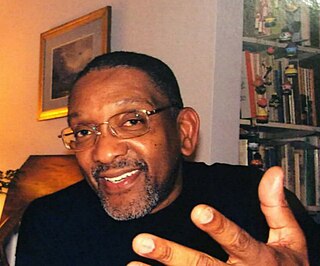Related Research Articles

Ralph Johnson Bunche was an American political scientist, diplomat, and leading actor in the mid-20th-century decolonization process and US civil rights movement, who received the 1950 Nobel Peace Prize for his late 1940s mediation in Israel. Among black Nobel laureates he is the first African American and first person of African descent to be awarded a Nobel Prize. He was involved in the formation and early administration of the United Nations, and played a major role in both the decolonization process and numerous UN peacekeeping operations.
Sirima Ratwatte Dias Bandaranaike, commonly known as Sirimavo Bandaranaike (මැතිනිය), was a Sri Lankan politician. She was the world's first female prime minister when she became Prime Minister of Sri Lanka in 1960. She chaired the Sri Lanka Freedom Party (SLFP) from 1960 to 1994 and served three terms as prime minister, two times as the chief executive, 1960 to 1965 and 1970 to 1977, and once again in a presidential system from 1994 to 2000, governing under the presidency of her daughter Chandrika Kumaratunga.

The World Peace Council (WPC) is an international organization with the stated goals of advocating for universal disarmament, sovereignty and independence and peaceful co-existence, and campaigns against imperialism, weapons of mass destruction and all forms of discrimination. Founded from an initiative of the Information Bureau of the Communist and Workers' Parties, WPC emerged from the bureau's worldview that divided humanity into Soviet-led "peace-loving" progressive forces and US-led "warmongering" capitalist countries. Throughout the Cold War, WPC operated as a front organization as it was controlled and largely funded by the Soviet Union, and refrained from criticizing or even defended the Soviet Union's involvement in numerous conflicts. These factors led to the decline of its influence over the peace movement in non-Communist countries. Its first president was the French physicist and activist Frédéric Joliot-Curie. It was based in Helsinki, Finland from 1968 to 1999, and since in Athens, Greece.

The Lanka Sama Samaja Party, often abbreviated as LSSP, is a major Trotskyist political party in Sri Lanka. It was the first political party in Sri Lanka, having been founded in 1935 by Leslie Goonewardene, N.M. Perera, Colvin R. de Silva, Philip Gunawardena and Robert Gunawardena. It currently is a member of the main ruling coalition in the government of Sri Lanka and is headed by Tissa Vitharana. The party was founded with leninist ideals, and is classified as a party with socialist aims.

Violet Vivienne Goonewardene, commonly known as "Vivi", was a Sri Lankan anti-colonial activist and prominent politician, serving as one of the world's first female ministers. A key figure in both the Indian independence movement and the Sri Lankan independence movement, Goonewardene was a prominent member on the non-aligned stage, where she fought against perceived injustices and was critical of the Middle East diplomacy sponsored by the United States. Goonewardene was the first and, to date, only female National Hero of Sri Lanka. By her death, she was one of the Left's most vibrant personalities, and the foremost female figure in the Sri Lankan leftist movement.

The first large-scale Asian–African or Afro–Asian Conference —also known as the Bandung Conference—was a meeting of Asian and African states, most of which were newly independent, which took place on 18–24 April 1955 in Bandung, West Java, Indonesia. The twenty-nine countries that participated represented a total population of 1.5 billion people, 54% of the world's population. The conference was organized by Indonesia, Burma (Myanmar), India, Ceylon, and Pakistan and was coordinated by Ruslan Abdulgani, secretary general of the Ministry of Foreign Affairs of the Republic of Indonesia.

The Sri Lankan state has been accused of state terrorism against the Tamil minority as well as the Sinhalese majority, during the two Marxist–Leninist insurrections. The Sri Lankan government and the Sri Lankan Armed Forces have been charged with massacres, indiscriminate shelling and bombing, extrajudicial killings, rape, torture, disappearance, arbitrary detention, forced displacement and economic blockade. According to Amnesty International state terror was institutionalized into Sri Lanka's laws, government and society.

Rajiva Wijesinha, MA, DPhil is a Sri Lankan writer in English, distinguished for his political analysis as well as creative and critical work. An academic by profession for much of his working career, he was most recently Senior Professor of Languages at the University of Sabaragamuwa, Sri Lanka.

For India, the concept of non-alignment began as a policy of non-participation in the military affairs of a bipolar world and in the context of colonialism aimed towards optimum involvement through multi-polar participation towards peace and security. It meant a country should be able to preserve a certain amount of freedom of action internationally. There was no set definition of non-alignment, which meant the term was interpreted differently by different politicians and governments, and varied in different contexts. The overall aims and principles found consensus among the movement members. Non-aligned countries, however, rarely attained the freedom of judgement they desired and their actual behaviour towards the movement's objectives, such as social justice and human rights, were unfulfilled in many cases. India's actions often resembled those of aligned countries. The response of the non-aligned nations during India's wars in 1962, 1965 and 1971 revealed non-aligned positions on issues such as secession. The non-aligned nations were unable to fulfil the role of peacekeepers during the Indo-China war of 1962 and the Indo-Pakistan war of 1965 despite meaningful attempts. The non-aligned response to the Bangladesh Liberation War and the following 1971 Indo-Pakistan War showed most of the non-aligned nations prioritised territorial integrity above human rights, which could be explained by the recently attained statehood for the non-aligned. During this period, India's non-aligned stance was questioned and criticized. Jawaharlal Nehru had not wanted the formalization of non-alignment and none of the non-aligned nations had commitments to help each other. The international rise of countries such as China also decreased incentives for the non-aligned countries to stand in solidarity with India.
Hamilton Shirley Amerasinghe, CCS was a Sri Lankan diplomat and civil servant. He was High Commissioner to India and concurrently Ambassador to both Nepal and Afghanistan (1963–1967) and Permanent Secretary of the Ministry of Finance and Treasury and the Ministry of Health. Amerasinghe served as Ceylon's Permanent Representative to the United Nations 1967 to 1980 and served as President of the United Nations General Assembly in 1976. He was also one of the leaders of the negotiations to draft the United Nations Convention on the Law of the Sea.

The Bandaranaike Memorial International Conference Hall (BMICH), is a convention center located in Colombo, Sri Lanka. Built between 1970 and 1973, the convention centre was a gift from the People's Republic of China in memory of Solomon Ridgeway Dias Bandaranaike, Prime Minister (1956–1959).
Richard Hart was a Jamaican historian, solicitor and politician. He was a founding member of the People's National Party (PNP) and one of the pioneers of Marxism in Jamaica. He played an important role in Jamaican politics in the years leading up to Independence in 1962. He subsequently was based in Guyana for two years, before relocating to London in 1965, working as a solicitor and co-founding the campaigning organisation Caribbean Labour Solidarity in 1974. He went on to serve as attorney-general in Grenada under the People's Revolutionary Government in 1983. He spent the latter years of his life in the UK, where he died in Bristol.

Franklyn Harvey was a Grenadian academic, activist and professional, a founder of the New Jewel Movement (NJM) and principal author of their manifesto. He had a significant influence on the development of the Caribbean new left throughout the 1960s and 1970s and later, in the animation of hundreds of municipal and community projects all around the world. When the NJM took over the government of Grenada on 13 March 1979, Harvey's contributions to their manifesto began to take concrete form across the island.
The Black Power Movement in Montreal in the 1960s was a period of rediscovering black identity through a process of invoking cultural, economic, and political thought amongst blacks. The eruption of political activism during Montreal's Quiet Revolution as well as the reformation of immigration policies which discriminated against non-white immigrants allowed black communities to publicly express and bring awareness to their struggles with racism. The movement was an integral component of the emerging global challenges to imperialism during the 1960s, stemming from various movements including Garveyism, pan-Africanism, the Harlem Renaissance, Rastafari, and others. Montreal's Black Power movement culminated in the aftermath of the Sir George Williams Affair—a student occupation that resulted in an estimated $2 million worth of damages and 97 arrests—which raised concerns of racism worldwide.

Seventh Summit Conference of Heads of State or Government of the Non-Aligned Movement on 7–12 March 1983 took place in New Delhi in India, one of the founders and leading members of the Non-Aligned Movement. The summit followed the 1979 summit in Havana, Cuba at which confrontation between moderate member states led by SFR Yugoslavia and India and radical states led by Cuba led the movement into crisis. The keynote address delivered by Prime Minister of India Indira Gandhi. At the summit in New Delhi Bahamas, Barbados, Colombia and Vanuatu were admitted as new member states, Papua New Guinea, Antigua and Barbuda as observers and Dominican Republic as an guest state. Cambodia was absent from the meeting due to rival delegations controversy, Saint Lucia failed to send a delegation while Luxembourg's request for an guest status was rejected on formalistic deadline grounds. 1,500 journalists followed the event.

The Non-Aligned Movement (NAM) is a forum of 120 countries that are not formally aligned with or against any major power bloc. After the United Nations, it is the largest grouping of states worldwide.

5th Summit of the Non-Aligned Movement on 16–19 August 1976 in Colombo, Sri Lanka was the conference of Heads of State or Government of the Non-Aligned Movement. 86 nations participated in the summit with additional 30 observers and guests representing all the continents in the world. The Summit is the biggest international conference ever held in Sri Lanka and one of the greatest achievements in its foreign policy. The event took place at the Bandaranaike Memorial International Conference Hall, the first purpose-built conference hall in Asia. It was the first heads of state or government summit of the movement to be organized in Asia. The decisions on the NAM Coordination Bureau organisation and membership conditions were formally defined at the Colombo Summit. The body was to have 25 members and was expected to meet regularly at the United Nations Headquarters in New York City.
10th Summit of the Non-Aligned Movement on 1–6 September 1992 in Jakarta, Indonesia was the conference of Heads of State or Government of the Non-Aligned Movement. Around 100 delegations, including some 60 heads of State or government, participated in the Summit in Jakarta.

1978 Non-Aligned Foreign Ministers Conference was held in Belgrade, SR Serbia, SFR Yugoslavia, between 25 and 30 July 1978. The conference was organized as a preparatory event ahead of the divisive 6th Summit of the Non-Aligned Movement which took place in Havana next year. The NAM member states were deeply divided over Cuban military actions in Africa and country's pro-Soviet politics with some of them threatened to boycott the Summit in Havana. The host country of Yugoslavia was recognized as the leader of the middle ground delegations which wanted to overcome divisions and radicalism and was in this effort supported primarily by India, Sri Lanka and Indonesia.
Sri Lanka is one of the founding members of the Non-Aligned Movement. Principles of Non-Alignment and participation in movement's activities is of high priority in foreign policy of the country.
References
- 1 2 3 Joan Cook (March 14, 1991). "Archibald Singham, 58, Professor And Authority on the Caribbean". New York Times.
- ↑ Aaron Kamugisha (2019). Beyond Coloniality: Citizenship and Freedom in the Caribbean Intellectual. Indiana University Press. pp. 12–14.
- ↑ A. W. Singham (1967). The colonial political system: a case study of political conflict in a British colony (Thesis). University of Michigan.
- ↑ Robert C. Smith (2018). Ronald W. Walters and the Fight for Black Power, 1969-2010. SUNY Press. p. 71. ISBN 9781438468679.
- ↑ "Statement of A. W. Singham, Department of Political Science, Brooklyn College". U.S. Military Actions in Grenada: Implications for U.S. Policy in the Eastern Caribbean : Hearings Before the Subcommittees on International Security and Scientific Affairs and on Western Hemisphere Affairs of the Committee on Foreign Affairs, House of Representatives, Ninety-eighth Congress, First Session, November 2, 3, and 16, 1983. U.S. Government Printing Office. 1984. pp. 102–106.
- ↑ Henry Vance Davis, ed. (1990). "In Memory of Dr. A. W. Singham". Sankofa: The University Since BAM: Twenty Years of Progress?. Office of Minority Affairs, University of Michigan. p. 78.
- ↑ "In memory of our colleague, Archie Singham (1932-1991), who said shortly before his death that this book would be a testament to the beginning of the end of the Cold War." Grace Lee Boggs; Michael Shuman; Julia Sweig, eds. (1991). Conditions of Peace: An Inquiry. EXPRO Press.
- ↑ "To the memory of Archie Singham (1932-1991): ardent, impassioned, much missed struggler for Peace." Colleen Roach, ed. (1993). Communication and Culture in War and Peace. Sage Publications, Inc. p. v. ISBN 9780803950634.